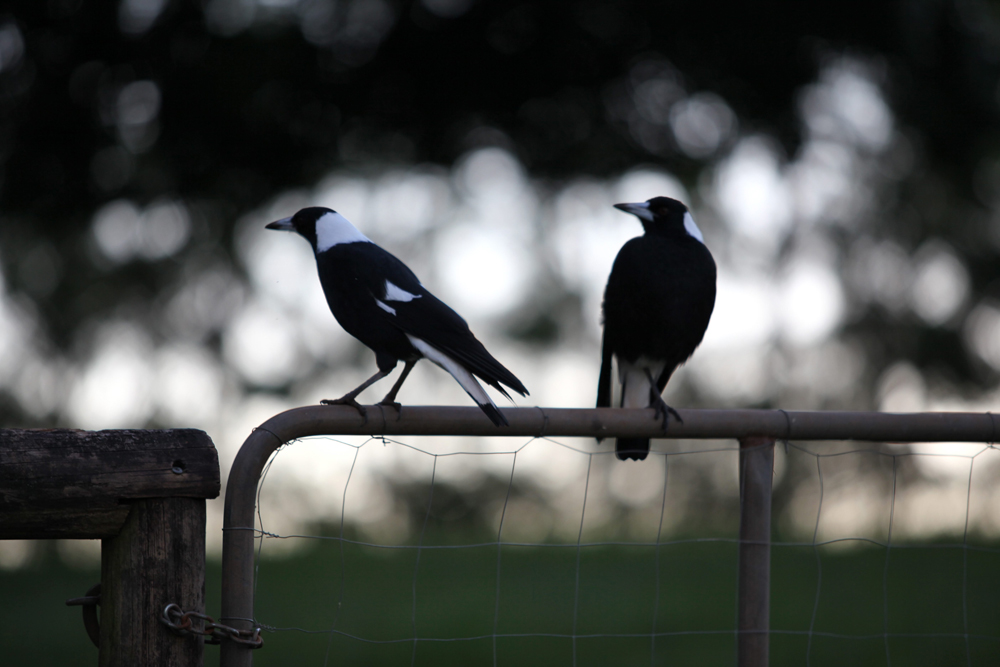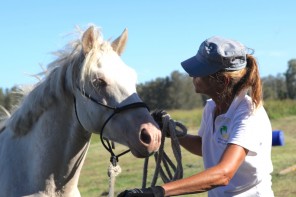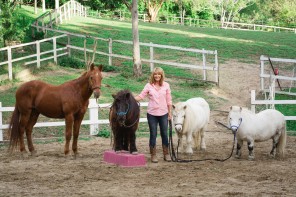 The stranger in our midst
The stranger in our midst
"And Quardle oodle ardle wardle doodle The magpies said" - Dennis Glover
For the six years we’ve lived at our property, we’ve shared it with a colony of magpies, or perhaps, more correctly, they’ve shared it with us. At least I thought it was a colony, until I thought I should find out the correct collective noun – and there seem to be a few on offer: congregation, tiding, tittering, gulp, charm or murder; although I’ve always thought it was a murder of crows. I’ve decided congregation is by far the most descriptive noun, since their singing sounds remarkably like a bird version of a church choir.
Their carolling is the first lovely noise we hear in the morning, and in the evening they gather interestedly to watch the preparation ofhttps://www.verandahmagazine.com.au/wp-content/uploads/2014/06/Candyflowertop10cm2.png the horse feed, and to ‘help’ the horses eat. There’s about 20 in our particular congregation, and they sing, squabble, eat and play very much like humans. It’s always been a harmonious relationship between the birds and people around here – that is until last year, when for the first time ever, an aggressive magpie somehow found his way into the pack.
Suddenly, I found myself being viciously swooped, and generally forgetting to arm myself with an ice-cream carton or hat, or even sunglasses on my head, I would find myself wearing a grubby feed bucket, or even ducking under a horse to get out of the way. I shouted at him, scolded him, explained to him that it was not how our magpies behaved, but he was having none of it, and kept up the aggression for what seemed like months. It’s usually the males that are the aggressors, and you can tell the males from the females by the fact that they have vivid white plumage on their necks, as opposed to the softer grey neck plumage of the females.
Magpies are well known as collectors of anything that catches their beady eyes. A friend of mine once rescued a baby female Magpie who grew up to be a fully-fledged family member. She could mimic the sheepdogs perfectly, and wasn’t above trying to round up the sheep herself. She also, if anyone was repairing anything, would helpfully arrive bearing twigs, or string or bark for you – her head cocked on one side, as if to say here you are, just for you!
Celtic folklore suggests that when two or more magpies fly into your life good fortune is on its way – although it doesn’t mention anything about one grumpy male unfortunately. They’re certainly clever, that’s for sure, surprising ornithologists with their adaptability to even a poisonous intruder, such as the introduced cane toad. It took the magpies of Australia only a few generations to learn to flip the toads over and attack their soft and non-venomous stomachs – showing a highly-social learned behaviour skill.
Magpies are highly valued for their symbolism as well – their vocal songs a joyous creative expression of themselves that we could well emulate. On the plus side they’re seen as communicative, social, extroverted and cheerful, their negative symbolic attributes include gossiping, deception, vanity, wilfulness and opportunism.
All that for one little bird! Curiously, and quite frequently, the East and West have different symbolic takes on animals, and that’s also true with the Magpie, which for the Chinese is considered a ‘Bird of Joy’ signifying good fortune, but in the West, in stricter Christian times, it was seen as a manifestation of the Devil himself.
Mark Twain once acquainted himself with a magpie on a visit to Australia and wrote:
…He had lived in a lady’s house several years, and believed he owned it. He was always on deck when not wanted, always having his own way, always tyrannizing over the dog, and always making the cat’s life a slow sorrow and a martyrdom. He knew a number of tunes and could sing them in perfect time and tune; and would do it, too, at any time that silence was wanted; but if he was asked to sing he would go out and take a walk.
With that kind of contrary personality no wonder my aggressor was deaf to my pleas of a truce! But curiously, this second year, he’s not so bad – still swooping and taking me by surprise, but not so viciously, and not so often.
Maybe by next year we’ll be friends, the Stranger in our Midst fully integrated, and our Magpie congregation and our family can live together in peace again.
In the meantime enjoy Australian poet Judith Wright’s wonderful magpie poem…
Poetry in motion
Magpies
Along the road the magpies walk
with hands in pockets, left and right.
They tilt their heads, and stroll and talk
in their well-fitted black and white.
They look like certain gentlemen
who seem most nonchalant and wise
until their meal is served – and then
what clashing beaks, what greedy eyes!
But not one man that I have heard
throws back his head in such a song
of grace and praise – no man nor bird.
Their greed is brief; their joy is long.
For each is born with such a throat
as thanks his God with every note.






I so enjoyed reading about your experiences with Magpies Candy, “for each is born with such a throat as thanks his God with every note” – reminds me to keep listening and paying attention to the symphony of birdsong we are blessed with living in this region. Thank you!